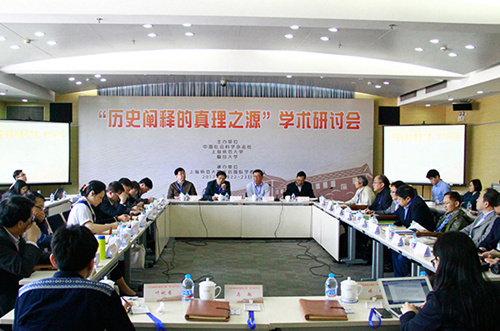
. > WHAT'S NEW > RESEARCH
Constructing contemporary Chinese historical hermeneutics
Author : LI XIAOXIAO, WANG HAIFENG Source : Chinese Social Sciences Today 2017-05-09

From April 22 to 23, the seminar on “The Truth of Historical Hermeneutics” was held at Shanghai Normal University. Attending scholars agreed on the basic principles and development for constructing a Chinese school of historical hermeneutics.
Relativism, in the context of historical interpretation, is an ancient school of ideology that had exerted profound influence. In terms of theoretical logic, historical relativism will eventually lead to historical skepticism and become the ideological and theoretical basis for historical nihilism. From April 22 to 23, the seminar on “The Truth of Historical Hermeneutics” was held at Shanghai Normal University. Scholars debated questions such as “proposition discrimination in regard to the idea that ‘everyone is a historian’” “discrimination about historical trends and fragmentation” “analysis of the relationship between historical and literary texts” “marginal problems and basic principles of historical hermeneutics” “objectivity and relativity of historical interpretation” “historical interpretation and values” and “historical interpretation in the context of historical materialism,” and agreed on the basic principles and development for constructing a Chinese school of historical hermeneutics.
Methodological principles
Zhang Xiong, a professor from the College of Humanities at Shanghai University of Finance and Economics, said the key to illustrating the truth of history lies in adherence to historical materialism. Its value lies in transcending metaphysics, which views historical ontology from abstract, conceptual, spiritual and subjective perspectives. Rather, it identifies historical ontology as focusing on humans that were involved in production and reproduction, and discussed the past and future of human history based on human activity. Ma Min, a professor of history from Central China Normal University, said that we should see objectivity, profundity and diversity in historical hermeneutics. Sun Jiang, a professor of history from Nanjing University, said constructing contemporary Chinese historical interpretation requires reflections on the following four aspects: truth, historical concepts, narration and ethics. Sun Xun, a professor from the School of Humanities at Shanghai Normal University, said that according to the methodological principles of historical materialism, every literary text contains infinite possibilities. But in textual interpretation, modest and reasonable interpretations are needed while excessive and compulsory interpretation should be avoided. Whether the text is overly interpreted depends critically on whether the facts described in the text are real.
Multi-dimensional reflections
Feng Ziyi, a professor of philosophy from Peking University, suggested that attention should be paid to the limits of historical narration, of the subjects and values of historical hermeneutics, as well as historical limits of value estimation. Zang Fengyu, a professor of philosophy from Renmin University of China, argues that the core of the discussion on the authenticity of historical interpretation from the perspective of historical materialism requires the establishment of the restrictive principle of historical interpretation. Dong Lihe, a professor of history from Beijing Normal University, emphasizes that the historical philosophy of speculation has a certain value for the study of history. The methodological significance of historical philosophy lies in the fact that the human mind cannot always be satisfied with a chaotic state of change. It will continue to pursue historical reality, therefore providing us with a sound and reasonable view of the world and history, and reestablishing people’s confidence towards history and the future.
Chinese consensus
The seminar reached some basic consensus on how to carry out historical interpretation. First, history is a fact, not imagination. Absolute historical relativisim regards history as imagination. It attempts to replace the flow and progress of knowledge with borderless imagination, and to provide a basis for imagining history by personal experience. The problem is that it has misinterpreted the relationship between events and facts, and between memory and facts. Second, history is a general trend, not fragments. It is the exploration and confirmation of historical law, rather than fragmented personal experience and memory. The historical trend consists of three aspects: the practice that determines or influences the historical process; the living state of human and national society; and the general law of historical development. Third, historical research is not just the investigation of details of the facts, or the consolidation and refreshment of memories of events. Its fundamental meaning lies in grasping historical trends and developing historical laws to guide human behavior in the future. Fourth, compulsorily interpreted history is not real history. The core of compulsory interpretation lies in the departure from historical facts and the subversion of the historical benchmark. This type of history comes to a conclusion that caters to preconceived assumptions. Fifth, the purpose of historical interpretation is to pursue certainty. It must begin with historical facts. The major rules in historical interpretation should be followed.
Ye Shengtao made Chinese fairy tales from a wilderness
Ye Shengtao (1894–1988) created the first collection of fairy tales in the history of Chinese children’s literature...
-
How northern ethnicities integrated into Chinese nation
2023-09-18
-
Mogao caves
2023-09-12
-
Mogao Grottoes as ‘a place of pilgrimage’
2023-09-12
-
Time-honored architectural traditions in China
2023-08-29
-
Disentangling the civilizational evolution of China
2023-08-28
-
AI ethics in science fiction
2023-08-23













 2011-2013 by www.cssn.cn. All Rights Reserved
2011-2013 by www.cssn.cn. All Rights Reserved